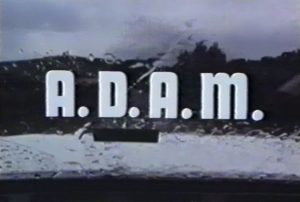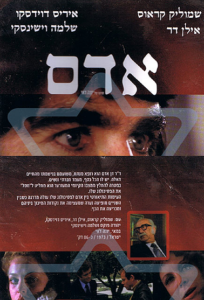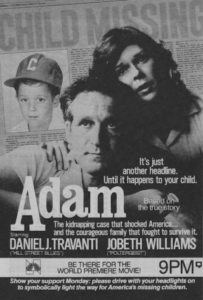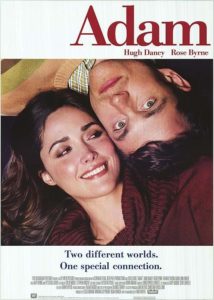ADAM: a good title, I’d say, and one in which, needless to add, I have a more-than-passing interest. In an age when everybody named John or Matthew brags about the sacramental significance of their monikers, Adam is (after Jesus) the ultimate Biblical Name. It’s also short, easy to pronounce and, most important to this article, fits easily on a movie theater marquee or in a TV guide listing.
The following four films—and make no mistake: they are all most definitely films, not movies—have little in common outside their shared title. In fact, you’ll have a hard time finding a more disparate grouping: a science fiction drama, an eccentric psychothriller, a reality-based tearjerker and a romantic comedy. Only one of those films, alas, is any good, with the others panning out as, variously, a decent try, a gruesome curiosity and a misguided disaster.
 First up is A.D.A.M., a 1973 made-for-British-television sci fi-er with a premise similar to that of DEMON SEED (the original Dean Koontz authored novel of which appeared the same year): a sentient computer that controls a house’s every function goes haywire upon becoming besotted with an attractive young woman. That woman is played by former Ken Russell regular Georgina Hale, who initially revels in the attentions of the computer, known as A.D.A.M. (voiced by Anthony Jackson), and no wonder: her architect hubbie (Willoughby Gray) is an authoritarian drip beside whom A.D.A.M. seems an infinitely preferable alternative.
First up is A.D.A.M., a 1973 made-for-British-television sci fi-er with a premise similar to that of DEMON SEED (the original Dean Koontz authored novel of which appeared the same year): a sentient computer that controls a house’s every function goes haywire upon becoming besotted with an attractive young woman. That woman is played by former Ken Russell regular Georgina Hale, who initially revels in the attentions of the computer, known as A.D.A.M. (voiced by Anthony Jackson), and no wonder: her architect hubbie (Willoughby Gray) is an authoritarian drip beside whom A.D.A.M. seems an infinitely preferable alternative.
Too bad screenwriter Donald Jonson never develops this twisted account much beyond its basic components. Jonson and director Michael Lindsay-Hogg spend a lot of time—some would say too much—developing their two human protagonists, with A.D.A.M., the most interesting character by far, paid shockingly little attention. The ultra-bleak ending is affecting, but it doesn’t justify the uneventfulness of the preceding drama.
1973 also provided the Israeli oddity ADAM. The first and apparently only “Israeli giallo,” it’s a strange, flamboyant and hard-hitting thriller  about a psychotic surgeon named, as the title portends, Adam (and played by Shmulik Kraus). The opening scene adequately sets the tone, showing Adam gleefully feeding a live mouse to his pet bird and then leering maniacally as the rodent is pecked to death. More animal cruelty is in store, including a frog crushed under a boot and a boar stabbed (complete with a close-up of blood oozing from the wound). What the purpose for all this ugliness was I’m not sure, but it does make for a distasteful viewing experience.
about a psychotic surgeon named, as the title portends, Adam (and played by Shmulik Kraus). The opening scene adequately sets the tone, showing Adam gleefully feeding a live mouse to his pet bird and then leering maniacally as the rodent is pecked to death. More animal cruelty is in store, including a frog crushed under a boot and a boar stabbed (complete with a close-up of blood oozing from the wound). What the purpose for all this ugliness was I’m not sure, but it does make for a distasteful viewing experience.
But onto the narrative, which involves Adam making threatening phone calls to an attractive woman (Iris Davidesco), whose psychologist hubbie (Ilan Dar) Adam is upset with because of a statement Dar made proclaiming that a truly self-aware man is incapable of murder. Adam strongly disagrees with that conclusion, and becomes determined to disprove it.
Notable elements include the striking art deco scenery (such as Adam’s mansion, which is straight out of THE JETSONS) and ultra-gaudy color scheme, which helps to at least partially elevate what without those things would probably seem a reprehensible film. In fact, the film is quite reprehensible anyway, and it certainly isn’t helped by the seriously crummy fizzle of an ending that according to the film’s director Yona Day (whose only film, unsurprisingly, this is) was downsized rather severely from his initial conception.
 If you were living in America and paying attention to TV trends back in 1983 then you surely remember the NBC TV movie ADAM. A dramatization of the 1981 disappearance of six-year-old Adam Walsh, and the subsequent struggles of his parents, played by Daniel J. Travanti and JoBeth Williams, to get the US government to pay more attention to the issue of child abduction, it was, after THE DAY AFTER, the most iconic TV movie of its era. ADAM has held up a lot better than THE DAY AFTER, although its portrayal of an America in which grieving parents are unable to get the government to go along with them seems downright surreal in these days of Amber Alerts, Megan’s Law and the popular AMERICA’S MOST WANTED TV program—which, of course, was hosted and produced by John Walsh, Adam’s real-life father.
If you were living in America and paying attention to TV trends back in 1983 then you surely remember the NBC TV movie ADAM. A dramatization of the 1981 disappearance of six-year-old Adam Walsh, and the subsequent struggles of his parents, played by Daniel J. Travanti and JoBeth Williams, to get the US government to pay more attention to the issue of child abduction, it was, after THE DAY AFTER, the most iconic TV movie of its era. ADAM has held up a lot better than THE DAY AFTER, although its portrayal of an America in which grieving parents are unable to get the government to go along with them seems downright surreal in these days of Amber Alerts, Megan’s Law and the popular AMERICA’S MOST WANTED TV program—which, of course, was hosted and produced by John Walsh, Adam’s real-life father.
Travanti is impeccable as John Walsh, and JoBeth Williams once again proves she has a special talent for playing grieving mothers (in a role not dissimilar to the one she essayed in POLTERGEIST). The early scenes with her in the Hollywood, FL department store where Adam disappeared are profoundly tense and alarming, as they should be, and played flawlessly. So too the later ones in which Travanti and Williams desperately attempt to find their son while constantly being (falsely) reassured that Adam will turn up shortly and everything will be alright.
As we all know, things did not turn out alright. Adam’s remains were eventually found in a Florida swamp and his parents were left devastated, a process this film takes us through step by agonizing step.
For completeness sake I’ll mention ADAM: HIS SONG CONTINUES, the much lesser 1986 sequel to ADAM. It shows what happened with the Walshes after ADAM premiered, in terms of unwanted media attention, further battles on Capitol Hill and the revelation of Adam’s possible murderer (serial killer Ottis Toole, whose complicity has since been confirmed). Far more scattershot and disjointed than its predecessor, it’s watchable, at least, but that’s about all it is, with much bad acting and indifferent filmmaking. It concludes on a stunningly bleak and unsettled note, with the Walshes attempting to rescue an abducted girl—and failing!
2009’s ADAM, the most atypical film on this list, is, conversely, a pretty typical indie rom-com. That means it thinks it’s a lot more daring  and unconventional than it actually is.
and unconventional than it actually is.
It’s yet another wholly unlikely love story between a seriously weird dude (Hugh Dancy) and a beautiful woman (Rose Byrne) who’s hopelessly out of his league—a situation that has become quite common in modern American cinema, so much so that it was already a cliché when this film appeared. Dancy, in the title role, has Asperger’s Syndrome, which as portrayed in this movie causes him to act like Rain Man’s annoying little brother, even though we’re evidently supposed to find his quirky behavior endearing. I predicted early on what beats this movie would hit—the meet cute, tentative romance, third act break-up and eventual teary reconciliation—and, with the exception of that last point (the unsettled ending is the one area in which writer-director Max Mayer can be said to really buck convention), was pretty dead-on.
The film, in short, is a by-the-numbers bummer. I’d recommend 500 DAYS OF SUMMER, another quirky indie rom-com from ‘09, in its place.
